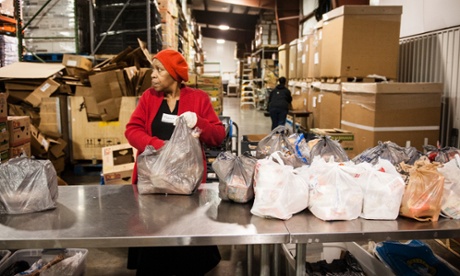As
Congress wrangles with whether to restore long-term unemployment
benefits, North Carolina is already experiencing the hardship likely to
unfold unless the program is restored

Eight hours may seem a long time to wait for a meal. But the line of cars that formed in a derelict parking lot in Hertford, North Carolina, early last Thursday morning, full of people waiting for a few cans of soup and some pasta from a local food bank, was nothing unusual. Almost every morning now, there is a line like that somewhere in North Carolina.
From a distance, the rows of cars look innocuous enough. But they are a symbol of the desperation that has gotten worse in North Carolina since July, when a swathe of cuts to unemployment benefits made it arguably the worst state in the US to be out of work.
The cars appeared in Hertford shortly before 8am, though the truck bringing the food was not scheduled to arrive until 4pm. Volunteers who hand out the food said it is not uncommon for cars to start lining up before dawn.
“I had a man the other day who said: ‘All I want is a bar of soap,’” said Laura Williams, a volunteer at the storage depot in nearby Elizabeth City. “Another man came in here and said: ‘Can you get me some toilet paper? I’ve been having to use coffee filters.’”
She added: “We get that a lot – people asking for toilet paper. But we can’t stock too much of that as we’ve got to concentrate on canned food.”
Washington has this month been dominated by a political fight over whether to restore a federal benefits program for the long-term unemployed, which was allowed to expire on 28 December, cutting off a lifeline to more than 1.4 million Americans. The White House and Democrats want to reinstate the benefits. Republicans are reluctant.
What North Carolina is currently experiencing is a foretaste of the economic story likely to unfold across the country unless the federal benefits are restored.
The people in line on Thursday constituted a cross-section of America’s poor. Of those who wound down their windows and agreed to talk, the eldest was 77, the youngest 19. They included pensioners, students, people working for minimum wage and some who had recently been laid off. They were there so early, and willing to wait so long, because they wanted to increase their chances of receiving perishable items rather than just canned goods. Get a spot near the front of the line, and you might get some fresh vegetables, bread, or even some frozen chicken.

By 4pm, there were more than 100 cars in the dilapidated parking lot – once a bustling shopping mall. At the very front were Floyd Liston, 59, and his friend, Bobby Bass, 65. Their story was not atypical.
Bass is retired after years working in a cotton mill. Liston, a diabetic, worked all his life but had to give up in 2011 after a routine blister on his foot deteriorated. Married with two daughters, Liston didn’t have health insurance and did not visit a doctor until it was too late. “The infection had eaten all the bone. They told me to go to the hospital and that night they took my leg off,” he said.
In February, in an attempt to address a $2bn debt that it owed the federal government, North Carolina passed a law that slashed both the number of weeks for which a job-seeker can receive state benefits and reduced the amount that it pays out in unemployment, from $535 a week to $350.
In doing so, North Carolina knowingly violated a contract with the federal government, resulting in the automatic cutting off of federal assistance for the long-term unemployed. The changes, which came into effect in July, therefore didn’t just cut the amount of support that people who lost their jobs received from their government by a third, it also meant the maximum length of time they could receive such benefits plummeted from 99 weeks to just 19.
“What happened in North Carolina was one the harshest cuts in unemployment benefits we’ve ever seen in this country,” said Mike Evangelist, a policy director at the National Employment Law Project. "Nothing I know of compares to it."
The precise impact of the benefits reduction in North Carolina is difficult to discern, said Larry Katz, a Harvard professor. But he and other economists have recently been pointing to figures that hint at an alarming phenomena: people have been dropping out of an already bleak labor market, and in record numbers.
Since July, when the cuts came into force, North Carolina has experienced the largest contraction in its labor force since record-keeping began in 1977. Remarkably, the sharp decline in the workforce in North Carolina, which has a population of 9.75 million, has even altered the national picture.
Timothy Littke, 55, from Lumberton, gave up looking for work in North Carolina in October. He was laid off from his job building hog feeders in June, a month before the benefits cuts kicked in.
He has since relocated to live with his daughter in Pittsburgh. The story of Littke’s departure says much about about deprivation in his old home of Lumberton – a small city in the south of the state which, by one measure, is the poorest in America.
Read More here





No comments:
Post a Comment
Hello and thank you for visiting my blog. Please share your thoughts and leave a comment :)